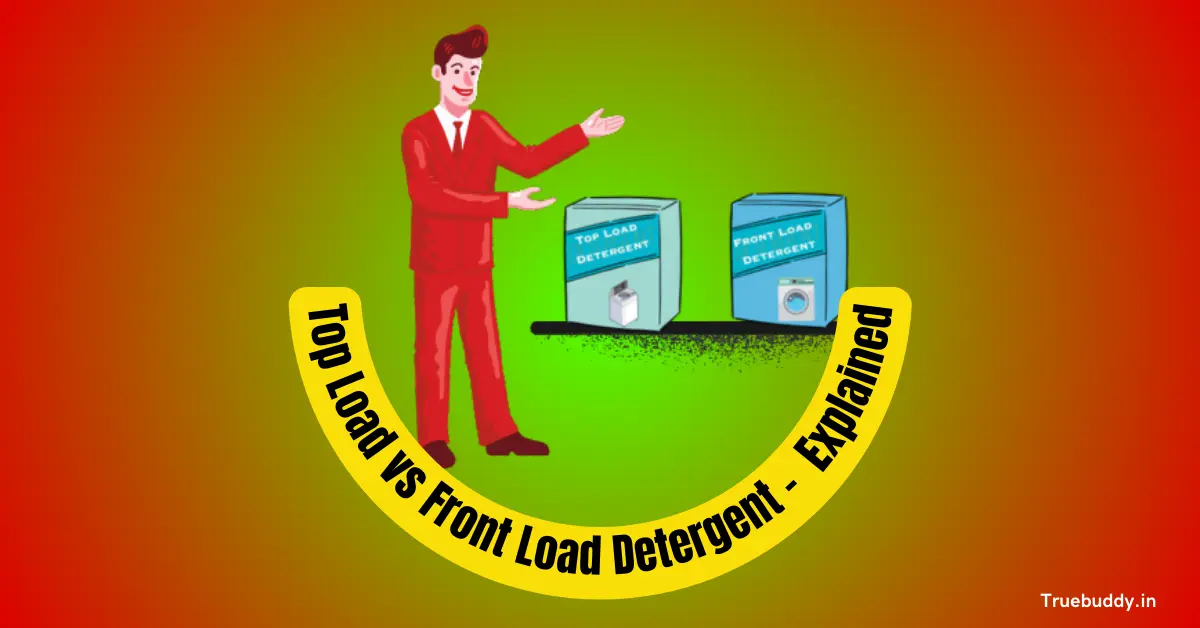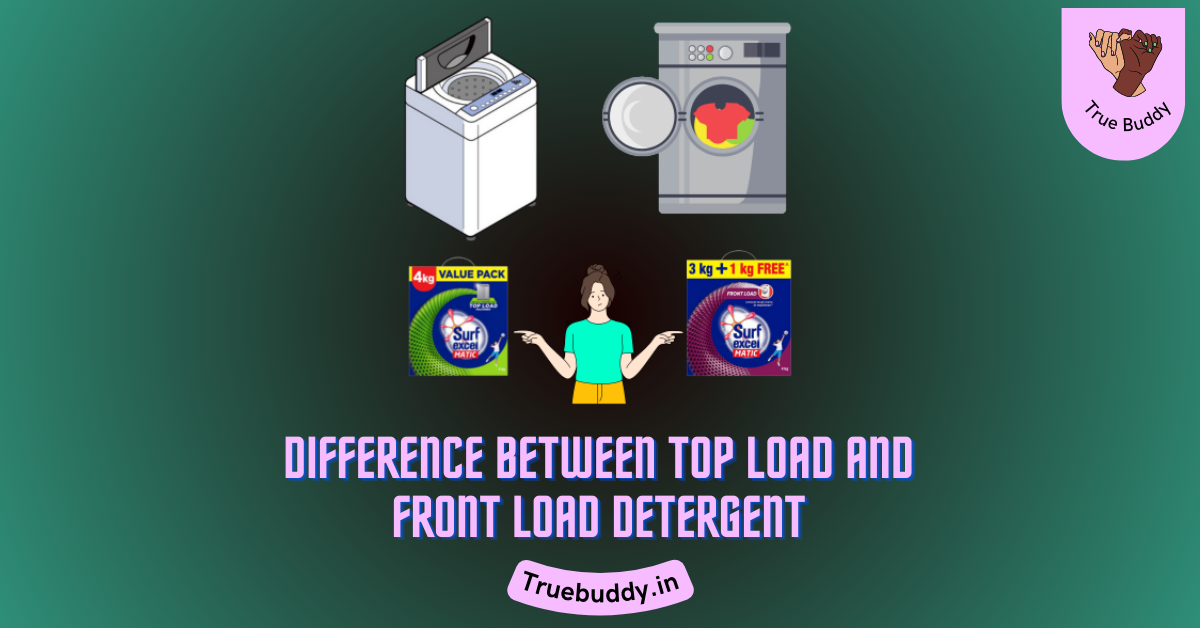Laundry detergents are essential to keep our clothes clean and fresh. With various brands and types available on the market, it’s important to choose the right detergent for your washing machine. Two popular options, top load and front load detergents, are designed specifically for their respective washing machine types. In this article, we will delve into the difference between Top Load vs Front Load Detergent, exploring the key formulations, washing machine compatibility, effectiveness, and environmental impact.
You may also like:
- 7 Best Washing Machines for Hard Water (Borewell Water) in India – Reviewed
- 10 Best Detergent for Top Load Washing Machines – Review and Buying Guide
By understanding these distinctions between top load vs front load detergent, you can make an informed decision and optimize your laundry routine. This will ensure the best results for your specific washing machine type.

Difference Between Top Load and Front Load Detergent
Formulation
One of the primary differences between top load and front load detergents lies in their formulations. Top load detergents are designed to produce a high level of suds, as top-loading machines typically rely on agitators to clean clothes. These agitators require more foam to effectively distribute the detergent throughout the load. Consequently, top load detergents often contain more surfactants and enzymes to produce extra foam and tackle tough stains.
On the other hand, front load detergents are formulated with low-sudsing properties. Front-loading washing machines rely on a tumbling action to clean clothes, which means excessive suds can interfere with the machine’s performance. Front load detergents contain fewer surfactants and enzymes, while maintaining a balance to effectively remove stains and maintain fabric integrity.
Washing Machine Compatibility
Choosing the appropriate detergent for your washing machine is crucial to achieve optimal cleaning results. Using the wrong detergent type can lead to excessive suds, poor cleaning performance, or even damage to the machine.
Top load detergents are specifically formulated for traditional top-loading machines with agitators. These machines can accommodate higher suds levels, and the agitator helps distribute the detergent and water mixture effectively. When using top load detergent in a front-loading machine, you may experience excessive sudsing, leading to subpar cleaning performance and potential damage to the machine.
Front load detergents, as the name suggests, are designed for front-loading washing machines. These machines have a horizontal drum that relies on gravity and tumbling action to clean clothes. The low-sudsing formula of front load detergents ensures efficient cleaning without excess foam, allowing the clothes to freely move in the drum and facilitating thorough rinsing. Using a top load detergent in a front-loading machine can result in excessive suds that might not be properly rinsed out, leading to residue on clothes and potential odor issues.
Effectiveness and Environmental Impact
Both top load and front load detergents are effective at cleaning clothes; however, their performance may vary depending on the machine type and the formulation of the detergent. Top load detergents excel at removing tough stains and dirt due to their higher surfactant and enzyme content. They are ideal for heavily soiled garments or households with active individuals engaged in outdoor activities. The higher sudsing action of top load detergents aids in the agitation process, assisting in stain removal.
Front load detergents, though low-sudsing, are equally effective at cleaning clothes. Their formula is optimized for the gentle tumbling action of front-loading machines. The absence of excessive suds allows the detergent to penetrate the fabric fibers, effectively removing stains without causing damage or wear to delicate garments. Front load detergents are well-suited for everyday laundry loads, maintaining fabric quality over time.
When it comes to environmental impact, front load detergents have an advantage. Their low-sudsing formulation requires less water during the rinsing process, leading to reduced water consumption and energy usage. Additionally, front load detergents often come in concentrated forms, requiring smaller packaging and less overall product per load, resulting in reduced waste. As sustainable practices become increasingly important, front load detergents offer an eco-friendly option for conscientious consumers.
| Aspect | Top Load Detergents | Front Load Detergents |
|---|---|---|
| Formulation | High sudsing | Low sudsing |
| Washing Machine Compatibility | Top-loading with agitators | Front-loading machines |
| Effectiveness | Effective in removing tough stains and dirt | Equally effective at removing stains and maintaining fabric quality |
| Environmental Impact | Higher water consumption, more packaging | Lower water consumption, concentrated formulas, reduced waste |
FAQs about Top Load vs Front Load Detergent
Q1: What is the main difference between top load and front load detergents?
The main difference lies in their formulations and compatibility with different types of washing machines. Top load detergents are designed for traditional top-loading machines with agitators, while front load detergents are formulated for front-loading machines with a horizontal drum.
Can I use top load detergent in a front-loading machine, or vice versa?
It is not recommended to use top load detergent in a front-loading machine or front load detergent in a top-loading machine. The different formulations and sudsing properties can affect the cleaning performance and potentially cause excessive sudsing or residue issues.
Are top load detergents more effective at stain removal?
Top load detergents are formulated to produce higher levels of suds and are often more effective at tackling tough stains. However, front load detergents are equally effective at cleaning clothes while maintaining fabric quality and integrity.
Which type of detergent is more environmentally friendly?
Front load detergents are generally considered more environmentally friendly. They often require less water during the rinsing process due to their low-sudsing formula, resulting in reduced water consumption. Additionally, front load detergents often come in concentrated forms, which require smaller packaging and generate less waste.
Can I use regular laundry detergent in a front-loading machine?
Regular laundry detergent is not recommended for front-loading machines as it tends to produce excessive suds that may not be properly rinsed out. It is best to use a detergent specifically formulated for front-loading machines to ensure optimal cleaning performance.
Can I use high-efficiency (HE) detergent in both top load and front load machines?
Yes, high-efficiency (HE) detergents are suitable for both top load and front load machines. However, it is important to follow the manufacturer’s instructions regarding the recommended dosage for your specific machine.
You may also like:
- What is Tumble Wash and How it Differs from Pulsator Wash or Impeller Wash?
- What is wash, rinse and spin in Washing Machine? Explained Here.
- How to Wash Blanket in Washing Machine? Explained Step-by-Step.
Conclusion
Choosing the right detergent is essential for optimal cleaning performance and maintaining the longevity of your washing machine. Top load detergents are tailored to traditional agitator-based machines and provide high sudsing action to tackle tough stains effectively. Conversely, front load detergents are formulated for front-loading machines, offering low-sudsing properties for efficient cleaning and fabric care. Understanding these distinctions will help you select the appropriate detergent for your specific machine, ensuring the best results with each wash.
Remember to always refer to the manufacturer’s instructions and guidelines for your washing machine and detergent usage. By making an informed decision and choosing the right detergent, you can keep your clothes fresh, clean, and well-maintained for years to come while minimizing your environmental impact.
- Best Non-Stick Tawa for Easy Roti Making - October 5, 2024
- Best Towel Racks to Keep Your Bathroom Organized and Tidy - October 5, 2024
- Upgrade Your Bathroom with the Best Mirror Cabinets in India - October 5, 2024
